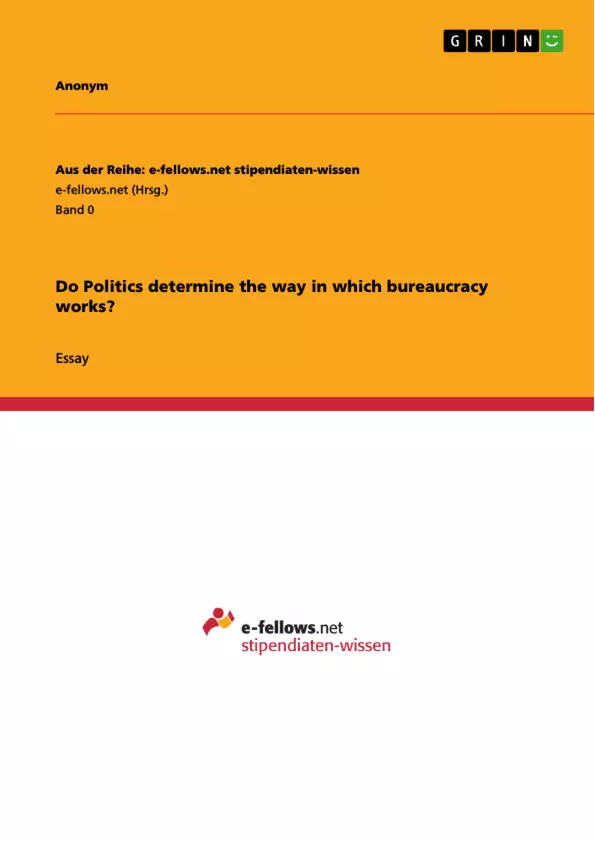The given proposition ‘politicians determine the way in which bureaucracy works’ may be approached from various perspectives. Starting from the assumption that politicians today do not have complete determination over the bureaucratic apparatus, I will focus on the discussion of two strategies which politicians may employ in order to increase their power over civil servants: administrative reforms and politicization of bureaucracy. While the former may enable politicians to determine how the bureaucratic apparatus functions as a whole, the latter seeks to enable politicians to determine the work within the bureaucracy via influencing the selection process of high-level officials.
This essay continues as follows: after providing a brief overview of the historic development of the power-relationship between politicians and bureaucrats until today, I will focus on the ‘outside’ strategy and discuss in how far politicians can initiate and direct administrative reforms, and which institutional factors determine their relative power positions vis-à-vis the administrative system. I will then turn to the ‘inside’ perspective and discuss the politicization of the bureaucracy as a means of increasing politicians’ power.
Inhaltsverzeichnis (Table of Contents)
- The rise of civil servants and the fail of the ideal-type relationship
- Control of bureaucracy by means of administrative reform
- Control over bureaucracy by means of politicization
Zielsetzung und Themenschwerpunkte (Objectives and Key Themes)
This essay examines the power relations between elected politicians and bureaucrats in modern democracies. It focuses on the extent to which politicians can influence bureaucratic activity and outcomes, particularly through administrative reforms and the politicization of the bureaucracy.
- The historical development of the power relationship between politicians and bureaucrats.
- The role of administrative reforms in shaping bureaucratic functioning.
- The impact of politicizing the bureaucracy on bureaucratic decision-making.
- The limitations of political control over bureaucracy.
- The potential effectiveness of different strategies for politicians to influence bureaucracy.
Zusammenfassung der Kapitel (Chapter Summaries)
- The essay starts by discussing the historical development of the power relationship between politicians and bureaucrats, highlighting the shift from the "ideal-type relationship" to a more complex reality where bureaucrats have gained greater autonomy.
- The essay then explores the strategy of administrative reforms as a means for politicians to control the bureaucracy. It analyzes how politicians can use reforms to reshape the "rules of the game" and influence bureaucratic behavior, drawing on examples from the UK and Germany.
- The essay moves on to discuss the strategy of politicization, which involves appointing partisan officials to high-level positions within the bureaucracy. It examines the potential benefits and drawbacks of politicization, drawing on empirical evidence from the United States.
Schlüsselwörter (Keywords)
This essay focuses on the power relations between politicians and bureaucrats in modern democracies, examining strategies such as administrative reforms and the politicization of the bureaucracy. It explores the limitations of political control over bureaucracy and the potential effectiveness of different strategies for politicians to influence bureaucratic activity and outcomes.
Frequently Asked Questions
Do politicians have complete control over the bureaucracy?
No, modern bureaucracy often holds significant autonomy. Politicians use specific strategies like administrative reforms and politicization to increase their influence.
What is the "politicization of bureaucracy"?
It involves the appointment of partisan officials to high-level civil service positions to ensure the administration follows the political agenda of the government.
How can administrative reforms change bureaucratic behavior?
Reforms can reshape the "rules of the game," such as organizational structures or performance incentives, thereby directing how the apparatus functions as a whole.
What is the "ideal-type relationship" between politicians and bureaucrats?
Historically, it was assumed that politicians make decisions and bureaucrats simply execute them. This essay discusses why this model has failed in reality.
Which institutional factors determine political power over administration?
The relative power depends on factors like the country's civil service tradition, the complexity of the tasks, and the legal framework governing the bureaucracy.
- Citation du texte
- Anonym (Auteur), 2013, Do Politics determine the way in which bureaucracy works?, Munich, GRIN Verlag, https://www.grin.com/document/1275912



